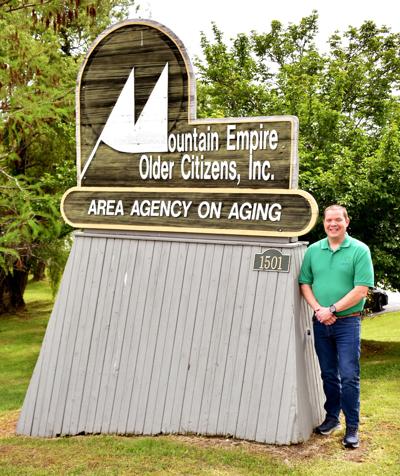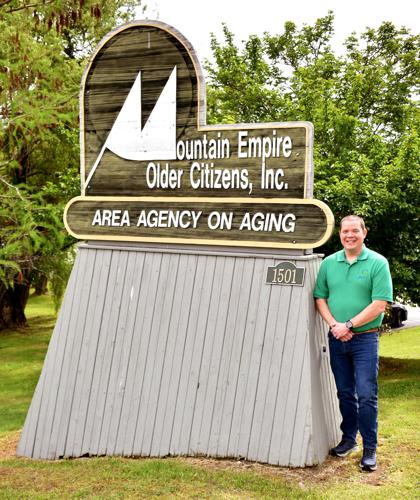BIG STONE GAP – For 51 years, Mountain Empire Older Citizens has helped support far Southwest Virginia’s senior population with services ranging from meals to helping the elderly maintain lives in their homes.
MEOC Executive Director Michael Wampler said the agency’s ability to provide those services is a question he and staffers are asking every day in the wake of Trump administration cuts and a proposed 2025-26 budget that could strike at approximately 30 different federal funding sources.
“We worry in order,” Wampler said Thursday of agency reaction to daily news of the federal funding situation. “We have concerns that the Administration for Community Living have had a lot of reduction in staff and, in some of these proposals, it appears that could possibly be dismantled and moved into other federal programs and departments.”
The federal Department of Health and Human Services, which oversees ACL, has seen a range of funding cuts since January through the Department of Government Efficiency. Wampler said ACL has been key to MEOC’s ability to provide senior services such as at-home meals delivery and congregate feeding centers.
MEOC’s PACE – Program for All-Inclusive Care for the Elderly – has operated for several years as a way to help elderly residents remain in their homes and stay connected to relatives and friends as long as possible before they need to move into nursing care. PACE also depends on HHS funding, Wampler said, and that funding is also uncertain in the next budget year.
Other agency programs involve helping seniors with chronic disease management, fall prevention and other health-related services – all done with some or all federal money – Wampler added.
The agency’s Mountain Empire Transit, which provides scheduled and on-demand bus rides for all residents in Scott, Lee and Wise counties and Norton, also depends in part on Federal Transit Administration grant funding.
While MEOC’s original mission involved serving the region’s elderly population, the organization has found itself over the decades filling needs for a broader age range such as a Child Advocacy Center for young abuse victims, the Mountain Laurel Cancer Support and Resource Center and Mountain Empire Transit.
Mountain Empire Transit provides scheduled and on-demand bus rides for all residents in Scott, Lee and Wise counties and Norton. IT also depends in part on Federal Transit Administration grant funding as well as state transportation grants that sometimes involve federal flow-through money.
After all programs are included, Wampler said, MEOC serves approximately 10,000 people of all age groups annually. The transit side has reached a level of approximately 130,000 one-way rider trips thanks to the on-demand MetGO service available in parts of Wise County.
MetGO’s popularity has led to planning for expansion into Lee and Scott counties, Wampler said, although the budget situation may slow that.
“The last time we looked at it, we had around 30 different funding sources,” said Wampler. “It’s a juggling act and, when these reorganizations and restructurings are taking place, we never know how it’s going to affect us. It’s hard to keep up with that many different programs and know how it’s going to affect our programs.”
MEOC helps clients navigate the processes for applying for Medicaid, Medicare and Supplemental Nutrition Assistance Program benefits, Wampler said. Those programs also face uncertainty under Trump administration budget priorities.
MEOC’s challenges reflect the situations facing the other 24 state Area Agencies on Aging that fall within a mix of planning district, individual county and city boundaries, Wampler said.
“That’s what we’ve talked about with our management team,” said Wampler. “We’re watching things but you just don’t know how it’s going to play out. Everything’s proposed right now.”
In previous years, Wampler said, even with changes in presidential administrations and party majorities in Congress, MEOC and its counterparts saw some stability and predictability in the federal budget process until now.
“I don’t know how to describe it,” said Wampler. “The best words I can think of to describe it are surprise announcements, unpredictable surprises. Sometimes you feel you have a little bit of an understanding of what may happen, and I don’t think that’s happening with some of these changes.”
While MEOC’s Emergency Fuel Fund to assist low-income elderly residents with winter heating fuel and bills operates only on donations, Wampler said a tightening economy affects the public’s ability to donate. The agency also connects clients in need to the state’s Low Income Energy Assistance Program, which provides another source of fuel and utility assistance along with weatherization help.
LIEAP also combines federal and state funding at a time of shifting federal budget priorities, Wampler said, and that could mean more stress for clients when winter arrives.
MEOC has seen long-term support for its programs and mission from state and congressional legislators, Wampler added.
Budget uncertainty means a greater need for reliable information as MEOC awaits the outcome of the federal budget process,” Wampler said.
“I would encourage everybody to pay attention to facts at the moment,” said Wampler. “Try to get information directly versus social media. If they have questions about specific programs or concerns, they can let us know and we’d be glad to address those directly.”
Online:
Mountain Empire Older Citizens —









